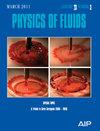带有冲刷孔的桥墩周围的拉格朗日相干结构
IF 4.1
2区 工程技术
Q1 MECHANICS
引用次数: 0
摘要
准确预测冲刷深度对桥梁的安全至关重要。桥墩上游的下沉流对冲刷孔的形成起着重要作用。本研究利用拉格朗日相干结构(LCS)推导出一个表达式,用于估算下沉流对沉积床施加的力。拉格朗日相干结构提取了码头上游的捕集区,该区域捕集了流体,然后将其转化为下沉流。本信推导的表达式可用于提高冲刷深度预测方程的效率。本文章由计算机程序翻译,如有差异,请以英文原文为准。
Lagrangian coherent structures around a bridge pier with scour hole
Accurate prediction of scour depth is essential for the safety of the bridge. The downflow upstream of the pier plays a significant role in scour hole formation. The present study used Lagrangian coherent structures (LCSs) to derive an expression to estimate the force exerted by the downflow on the sediment bed. The LCSs extracted a trapping region upstream of the pier, which trapped the fluid, which was then converted into downflow. The expressions derived in this Letter can be used to improve the efficiency of scour depth prediction equations.
求助全文
通过发布文献求助,成功后即可免费获取论文全文。
去求助
来源期刊

Physics of Fluids
物理-力学
CiteScore
6.50
自引率
41.30%
发文量
2063
审稿时长
2.6 months
期刊介绍:
Physics of Fluids (PoF) is a preeminent journal devoted to publishing original theoretical, computational, and experimental contributions to the understanding of the dynamics of gases, liquids, and complex or multiphase fluids. Topics published in PoF are diverse and reflect the most important subjects in fluid dynamics, including, but not limited to:
-Acoustics
-Aerospace and aeronautical flow
-Astrophysical flow
-Biofluid mechanics
-Cavitation and cavitating flows
-Combustion flows
-Complex fluids
-Compressible flow
-Computational fluid dynamics
-Contact lines
-Continuum mechanics
-Convection
-Cryogenic flow
-Droplets
-Electrical and magnetic effects in fluid flow
-Foam, bubble, and film mechanics
-Flow control
-Flow instability and transition
-Flow orientation and anisotropy
-Flows with other transport phenomena
-Flows with complex boundary conditions
-Flow visualization
-Fluid mechanics
-Fluid physical properties
-Fluid–structure interactions
-Free surface flows
-Geophysical flow
-Interfacial flow
-Knudsen flow
-Laminar flow
-Liquid crystals
-Mathematics of fluids
-Micro- and nanofluid mechanics
-Mixing
-Molecular theory
-Nanofluidics
-Particulate, multiphase, and granular flow
-Processing flows
-Relativistic fluid mechanics
-Rotating flows
-Shock wave phenomena
-Soft matter
-Stratified flows
-Supercritical fluids
-Superfluidity
-Thermodynamics of flow systems
-Transonic flow
-Turbulent flow
-Viscous and non-Newtonian flow
-Viscoelasticity
-Vortex dynamics
-Waves
 求助内容:
求助内容: 应助结果提醒方式:
应助结果提醒方式:


